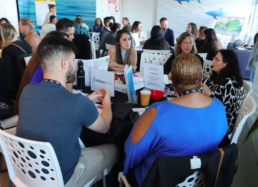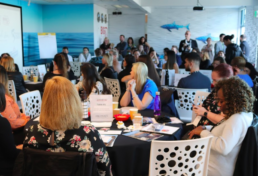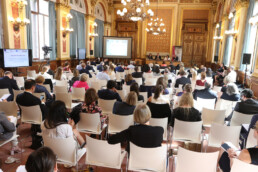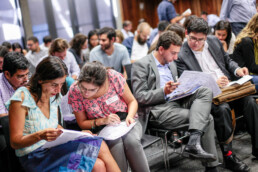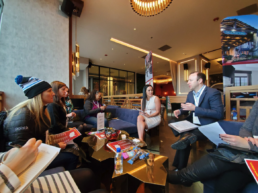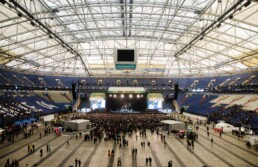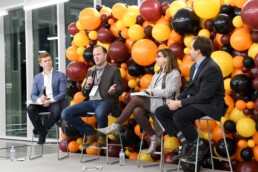Corporate Social Responsibility: The Power of Team-Building Events for a Good Cause
By Gavin Tolentino
It sounds like a desk-nap dream: You, bonding with coworkers as you make a difference in the world together, while your workplace and reputation in the community get better and better.Â
Not only is this possible, says Odyssey Teams, it's what they've been doing for companies for nearly 30 years, by facilitating team-building events with a socially responsible outcome. At the recent Planner Master Class at San Francisco's Aquarium by the Bay, the question was not whether Corporate Social Responsibility (CSR) works, but how to implement a CSR plan that maximizes mutual, lasting benefits to a workplace and its community.
Leading our roundtable was Kim Clary, Odyssey's Director of Client Success. She and more than 70 event professionals shared these Do's and Don'ts of a well-planned CSR event, and how to inspire staff participants in a life-changing way to strategically improve a company:Â
Do:
- Speak in depth: with participants to formulate your CSR plan. Understand what is personally meaningful to them, and identify a common, community-supportive purpose.
- Plan a multi-layered activity: to enable specific workplace improvements. Can merging departments use this opportunity to gel? Do you want to encourage leadership or teamwork with specific staff members? Or inspire a culture change or new awareness? Be deliberate when assigning tasks, teams, and seating.
- Get out of the office: Host the event in a business-neutral environment where office roles don't apply.
- Witness your work: Create a lifelong memory by interacting with the beneficiaries of your efforts. For example, if your team is building toys for children, have the children on-hand to receive the toys and play together with participants.
- Designate time to reflect: After the event ask participants to share their experiences and explore deeper meanings.
Don't:
- Simply "check the CSR box": A company may have a mandatory 'volunteer service day' with a pre-selected organization, or allow staff to participate in unrelated causes on their own. Although positive, this strategy misses out on the wealth of benefits a team-building CSR event can provide.
- Create a plan contingent on other factors: For example, "If we reach this financial goal, we will use the extra money to support a cause," or "If we complete this project ahead of schedule we will use the extra time to volunteer." Have an organized structure yielding guaranteed outcomes.
- Have beneficiaries witness the entire process: It's not always necessary to have community members or beneficiaries looking over the shoulders of staff participants. Their presence may potentially alter the team-building benefits of trial, error, and problem solving.
- Confuse corporate branding with community support: The perception between helping a community, and using a community to promote your company takes a delicate balance. Giving time and energy to a cause your participants genuinely care about will show.
Examples of successful CSR initiatives from attendees:
- A company had an employee whose child was disabled. The staff chose to help build an inclusive playground in their area, in conjunction with the Magical Bridge Foundation, and it is a source of inspiration and pride they hold dear.
- One of many workshops Odyssey Teams offer is called Helping Hands, where teams build prosthetic hands for people without the medical or financial means to acquire one. When participants see their prosthetic hands being used, there is a strong emotional connection they will always remember.
- A staff's mutual passion was music, so they partnered with a youth organization and spent a day creating fun, original songs with children. A contest was held to see which staff-child team was the best, with the winning child awarded their favorite instrument. At the end of the event, every child was surprised with an instrument of their choice, and the kids were overjoyed.
Numerous companies and studies have proven that a successful and righteous business can achieve a mythical reputation, because they have mastered the complicated trifecta of being profitable, having happy, productive employees, and doing something good for the world. Planning a CSR event based on team-building and good-will can help a company achieve these ever-fleeting goals.
Gavin owns an event production firm in San Francisco and has managed events in the Bay Area for 18 years.
Coronavirus: Advice from the Experts
By Maria Lenhart
Coronavirus is pointing up the need for meeting professionals to be prepared, not only for this particular crisis but for any infectious disease outbreak. Industry experts say a wise approach to contracts, insurance coverage, communication and common-sense precautions can minimize the consequences
Force Majeure Clauses
When it comes to protection from a disastrous situation causing a meeting to be cancelled or lose attendance, meetings industry attorneys say the starting point is the Force Majeure clause in any contract with hotels and meeting facilities.
These clauses need to cover every situation outside of the contracting parties that might cause the planner to cancel the meeting, says meetings industry attorney Joshua Grimes of the Grimes Law Offices in Philadelphia. It may also allow for a meeting to be reduced in appropriate circumstances, rather than a total cancellation.
However, Grimes notes that a typical Force Majeure clauses may not fully protect the planner from attrition penalties in the case of a health crisis.
"Some Force Majeure provisions may cover a health concern like coronavirus, but they usually do not contemplate a situation where attendees may not want to travel out of fear of catching an illness that is centered in another location", he says. "Similarly, Force Majeure clauses usually do not anticipate that some attendees may be banned from leaving their countries."
"In these cases, it's crucial for planners to have a dialogue with their hotels and other vendors", he adds.
"If one group is thinking of canceling an event, others probably are as well", Grimes said. "The venues and vendors may have a suggested solution that would work for all involved."
"If no resolution can be found through discussions, the next course of action is to read the contract carefully, preferably with an attorney, to see if there are provisions or nuances that would allow the planner to get some relief", Grimes adds.
For example, if the Force Majeure clause excuses performance in part based on an unforeseen occurrence, the planner may have a contractual right to reduce the event without liability, he says.
Attorney Barbara Dunn, partner at Barnes & Thornberg LLP in Chicago, emphasizes the importance of including a catchall provision in the Force Majeure clause that covers anything that prohibits fulfillment of the meeting.
"For example, the clause may not mention infectious disease, but it does say 'any other cause beyond the party's control'", she says. "We can never list all the specific things that can go wrong."
Insurance Coverage
Purchasing event cancellation insurance is another way to protect against financial loss due to a health crisis or other disaster. Coverage is especially important in the case of meetings and trade shows that are a revenue source for an organization, according to Dunn.
"Many organizations don't purchase it, despite recommendations from lawyers, because of the high premium cost", she said. The reason the cost is high is because the coverage is that good it really underwrites the bottom line revenue for your meeting.
Dunn notes that such policies not only cover cancellation, but reduced attendance. However, she cautions that coverage for terrorist incidents or infectious disease is usually not included in basic premiums, but requires endorsements at added cost.
Plan of Action
Tyra Hilliard, an attorney and expert on meetings risk management issues, stresses the importance of having a crisis plan in place. While many organizations have such plans, she notes that all too often they don't specifically pertain to meetings.
Fortunately, there are resources that meeting planners can use in formulating a plan. Along with consultation with risk management experts, Hilliard recommends visiting the U.S. Government's FEMA website, which offers an emergency response plan template for events. -https://training.fema.gov/emiweb/downloads/is15aspecialeventsplanning-jamanual.pdf)
Along with formulating a written plan that addresses issues such as emergency response and business continuity, Hilliard says it's essential to work with hotel and security staff from the very beginning.
"You need to ask the right questions of your partners before you get on site," she said. "This should happen at the RFP stage. Make it part of the criteria for choosing partners."
Health Safety Practices
To protect against a health crisis, vetting partners on their sanitation practices and educating attendees on precautions also come into play.
"We all need to ask more of our vendors about what they are doing, not just in regards to the coronavirus but with all flus and other diseases," says meetings educator Joan Eisenstodt. "For example, do they have hand sanitizers, do they provide flu shots for their employees? As planners, we need to ask hard questions and let hotels know how important this is to us."
Event planner and food and beverage consultant Tracy Stuckwrath of Thrive Meetings & Events agrees, adding that planners should learn what they can about housekeeping and food service practices.
"You need to ask hotels about how they keep rooms sanitized, do housekeepers wipe down handles, do they disinfect the rooms in between guests?"she says. "Who on your staff has food safety certification? What are your practices with buffets? Have you taken steps to remind your employees about safe food handling?"
Also important is to remind attendees about the basics of staying healthy, Eisenstodt says.
"A lot of it is the usual stuff which may seem silly but isn't at all-providing hand sanitizer and hospital-grade wipes, reminding people to wash their hands and to refrain from hugging or shaking hands. You can do this with firmness but with some humor from a mainstage."
Communication Plan
When disaster threatens an event, having a strong communications plan in place is also important. According to Stuckrath, there should be a variety of channels in place for communicating information to attendees, before, during and after the meeting.
"You can't just rely on the meetings app-you can't assume everyone has downloaded it," she says. "You'll need to use the website, texting, e-mails, social media-whatever it takes for everyone to get the information they need. This applies not only during the event, but afterwards. Sometimes people get infected during the meeting, but don?t show signs until it?s over. How do you handle that?"
Barbara Dunn recommends enlisting the aid of a public relations or crisis communication expert if circumstances warrant it.
"What we say and how we say it are very important during a crisis," she said. "We need to acknowledge the tragic nature, but we don't want to stoke fear or hysteria. Having someone come across as insensitive could create big problem for the organization. It could spark wildfire on social media."
Reliable Sources
Risk management experts say it is essential to consult trusted sources in the destination and organizations such as the World Health Organization (www.who.int) and Centers for Disease Control (www.cdc.gov) rather than simply follow media coverage, which may paint a distorted picture.
PCMA (www.pcma.org) is partnering with the Corporate Event Marketing Association (www.cemaonline.com) on a series of interactive webinars over the next few weeks:?
|
We are partnering with CEMA to announce a series of interactive webinars over the next few weeks to get you what you need. Click the links for more information and to register:
We have also begun working with our leadership, infectious disease experts, regional advisory boards, business partners and our members to define the foundational objectives of our COVID-19 recovery efforts. |
Among the many other organizations offering coronavirus guidelines are the National Restaurant Association (www.restaurant.org) and HUB International (www.hubinternational.com), a risk management services company.
Maria Lenhart is an award-winning writer, editor and content marketer specializing in travel, tourism and the meetings industry. Her work has appeared in over 100 publications.
Coronavirus: Event Planners Discuss Real-Life Dilemmas
By Maria Lenhart
The coronavirus or COVID-19 crisis was the hot topic during roundtable discussions at Ateema Media & Marketing's Meeting Planner Master Class held at San Francisco's Aquarium of the Bay on March 4.
Dealing with postponements and cancellations were of upmost concern for many planners, including Tanika Thacker, event marketing manager for Demandbase, who said the tech marketing firm has cancelled its annual conference, the ABM Innovation Summit, originally scheduled for March 17-18.
"Our leadership is trying to figure out what to do next, to identify the next steps," she said. "This really effects our cadence. Fortunately, we've had a lot of support and our sponsors are hanging in there. We also know we need to calm down a little bit and manage the relevant data."
Benito Aguila, senior global event lead for Wind River, a software company, has already had to deal with headaches stemming from the cancelled Mobile World Congress Barcelona 2020. His company was set to participate in the massive wireless industry show scheduled for late February.
"Fortunately, our vendor has agreed to store our booth for a year, so we won't lose our materials," he said. "However, our hotel contract did not fall under our Force Majeure clause because the organizer pulled the conference and it was not caused by a natural disaster."
Pooja Klebig, regional special events manager for the American Red Cross, said her organization is cancelling upcoming fundraising events and is in a quandary. She herself is "listening to a lot of classical music and trying to stay calm."
Klebig said the big issue now is grappling with potential losses, including those from a tradeshow that had already been booked. "We don't yet know what we have to pay fully for-we're playing it by ear," she said. "Our vendors have been super nice and we're waiting with them. It's out of our hands."
The ramifications of postponement was raised by Lateefah Cavit, strategic meetings manager for Autodesk, Inc. "Someone I know postponed a meeting, but then it ended up too close to another meeting next in the schedule," she said. "So where are the new products to sell at that next event?"
Managing the potential losses from food and entertainment at events that are cancelled at the last minute is another issue. A planner who wished to remain anonymous said she was faced with a major dilemma when an elaborate hotel event for 1,000 people was scrapped at the last minute.
"The chef had ordered the food, including a 275-pound blue fin tuna from Japan that cost $12,000," she said. "I had entertainers already flying in that I couldn't notify. We were told to not rebook the event, so we have to deal with a lot of damages. Fortunately, someone else agreed to buy the tuna."
Other planners lamented the mass hysteria and misinformation that is surrounding the industry at the moment.
James Hobbs, senior director of global programs for Meeting Expectations in Atlanta, said that it is important for meeting planners to 'not try to be medical professionals' but to refer concerned attendees to official sources such as the Centers for Disease Control and the World Health Organization.
"Use your marketing arm to write any communications verbiage," he added. "Be very cautious of anything you put in an email."
Molly Glover, event specialist for the National Accelerator Laboratory, raised the issue of sensitive communication with at-risk attendees and said it was important to have a communications plan in place.
"If you have older people, who are the most susceptible to getting sick, coming to the meeting, how do you tell people to stay home without offending them?" she said. "How do you approach this diplomatically?"
Glover added that in order to minimize risk at upcoming meetings, the laboratory has decided to hold two smaller events rather than one large one.
Many planners said they were taking a closer look at their contracts with hotels and venues, particularly at Force Majeure clauses.
Kara Lee, marketing and events manager at Covington & Burlington, is among them.
"We do a lot of receptions for events, but we don't plan the core conference," she said. "We're now realizing that our contracts have to address our particular situation. Everyone needs to be looking at their contracts. Make sure you have a clause about what happens if the conference is cancelled."
Maria Lenhart is an award-winning writer, editor and content marketer specializing in travel, tourism and the meetings industry. Her work has appeared in over 100 publications.
Building a Community, Not Just an Audience
Engagement is the bedrock of human connection and in order to build a community, organizations need to engage with audiences beyond a yearly event. Developing opportunities that give audiences the ability to interact and connect with your brand over time, and in ways the they desire, allows fans to become your advocates. Taking the steps to connect with external customers can solidify your organization as a key stakeholder in the development of their career and create lifelong brand champions. Here are some tips on how you can create year-round engagement opportunities for your community.
Create Engaging Content
What kind of content are you creating? Is the content you're creating the content that your audience wants to see? Creating relevant content for your consumers to encourage and excite them to actively interact with your brand is a fantastic way to strengthen your community. A monthly or daily newsletter, a blog, YouTube or Instagram videos are great channels to utilize when creating different kinds of content. Start pushing content out and use that to determine how your community wants to interact with you and then focus in on that channel. Once you're creating content that your audience wants and enjoys, you are able to instill brand confidence and create active members of your community that actively read and share your content.
Create Networking Opportunities
Linkedin groups, happy hours, breakfast meetups and round-table discussions are great ways to connect your audience to each other and help foster a community. Develop networking opportunities and create a supportive environment for attendees year round, beyond a specific event, promotes trust and illustrates that your organization cares about attendees beyond a one-time event.
Reward Your Community
Once your audience has shown an interest in engaging with you, once they've attended an event or a networking opportunity and shared some content, reward them and show them your appreciation. Acknowledge that you know they can go elsewhere for content and events and show gratitude that they are choosing you over the many options available to them. Develop a relationship that is mutually agreeable and beneficial by creating a customer appreciation program. Perhaps your audience is granted free access to networking experiences for sharing content or money off of your yearly event or VIP access to networking events or special content. Give them something that promotes your appreciation of them and keeps them interested and coming back for more.
In a World Full of Distractions, Don't Create More.
It's easy to think that the more content you push out, the more chances your audience has to engage with you which, in theory, should solidify their position in your community. It's easy to think that if you offer a few cocktail receptions throughout the year that that's all they will need to stay engaged. Unfortunately, that's not always the case. Engagement and being part of a community comes down to trust and connection. Does your audience trust your brand and do they feel connected to it? Ask them. And ask them often. Communicate with your audience to ensure the content your creating is the content they want, that the networking opportunities you offer interest them and that they feel seen and heard. Once an audience feels these things, they will become an essential community for your organization.
Original article located on ExpoPass.com
From an Attendee: How a Chicago Planner Event Mastered the Roundtable Discussion
Original article from Corporate Event News
 When I first learned about Chicago Planner Master Class, I was intrigued. Put on by Ateema Media & Marketing, this series of events designed specifically for professional event planners and event marketers isn't a typical talking-head education session or a loose networking opportunity. Instead, events (which take place several times a year) are structured as a brief introduction from a partner sponsor followed by 10 roundtable discussions on topics pre-selected by attendees.
When I first learned about Chicago Planner Master Class, I was intrigued. Put on by Ateema Media & Marketing, this series of events designed specifically for professional event planners and event marketers isn't a typical talking-head education session or a loose networking opportunity. Instead, events (which take place several times a year) are structured as a brief introduction from a partner sponsor followed by 10 roundtable discussions on topics pre-selected by attendees.
I attended my first one this week and not only did I learn a lot, I was also impressed with the layout and flow of the event. Here are a few tips for planning your own event roundtables, based on Ateema's success with this series.
Choose the right venue
The Master Class I attended took place at SX Sky Bar, in the recently overhauled Hotel Essex in Chicago's South Loop. With a wide range of oversized, colorful furniture and unique nooks throughout the space, this new venue - also filled with natural light and overlooking Grant Park - lends itself perfectly to intimate group discussions. It was fun to flow through the space and pick a new perch, from a cozy booth to an Alice in Wonderland-esque high-backed chair to a low stool. In a typical ballroom setting with standard round tables, the structure of this event would not have been nearly as engaging.
Carefully explain the format to attendees ahead of time ? several times
Ateema did a great job sending out informative email communications several days in advance of the event. This pre-event information, combined with an agenda handed out on-site (see below), ensured all participants knew exactly how the event would flow.
Pick relevant discussion topics
The discussion topics at the event were preselected in advance based on feedback from attendees, which was an excellent way to encourage participation and build interest. It's important to pick relevant and timely topics that pique attendees' interest (for example, we could have easily added a topic around health at events, based on the current coronavirus outbreak).
Here's what we talked about in the class:
- How to draft a site plan while in a unique venue
- Questions to consider when partnering with a DMC
- Benefits of gamification at your events
- How to find local planner resources
- Digital marketing strategies for your next big event
- Using events as an outlet for CSR
- What to look for when inspecting a potential event site
- Choosing spatial assignments to best fit your event
- How to incorporate new technology into your event design
Make agendas that are easy to follow
Building schedules in advance and assigning each person an order of tables would have been complicated and time-consuming for event staff. Instead, a staffer simply had a stack of schedules and handed them out one by one, in no particular order, during registration. This was an easy way to ensure everyone had a unique schedule and groups would be randomized, so that you'd interact with different groups at each session.
Stick to the scheduled times
While the event intro kicked off about 10 minutes late, the rest of the morning went as planned: From 9AM to 12PM, attendees visited all 10 roundtable discussions, following the format of 1 minute for brief introductions, 3 minutes of sponsor pitch and then 10-12 minutes of group discussion. Event organizers raised the volume of the music when it was time to switch areas, an easy way to signal the transition without being intrusive. We had 2 minutes to migrate to the next table, just like musical chairs. Keeping to schedule meant there was no confusion over what was taking place, when.
Incorporate at least one active station
Two of the 10 stations featured something active. At one roundtable, we talked while making DIY candles from sand wax and fragrance in partnership with Live Art International (a company that sources live entertainment for groups), and another 'roundtable' was a quick tour of Hotel Essex. We walked and talked quickly and got our blood flowing, which stimulated learning and knowledge retention from the morning.
Create sponsorship activations
Having a sponsor for each roundtable discussion was a killer way for event organizers to help cover their costs (or maybe even make a profit). For the most part, each sponsor was experienced with the topic at hand (for example, Luxe Productions led the group on new event technologies) and as such, attendees were keen to ask questions and be involved in the discussion.
Want to check out Chicago Master Planner Class for yourself? The next one is set for March 24 at City Winery; learn more here. Ateema also holds events in San Francisco.
How have you incorporated roundtable discussions into your events? What formats have brought you success, or what challenges have you learned from? Share with us in the comments or email me.
4 Ways to Inspire Exhibitors to Adopt New Technology

The "If it ain't broke" mentality sounds good if we're talking about a bicycle or a toaster. But when we're talking about business tech, people in every industry have a natural reluctance that blinds us to possibility. Yes, it's working fine, but it could be working better. When we introduce new tech, we usually get a big surge up front from the early adopters, and then it tapers right off. So how do you hook those people in the middle and keep the bell curve going? Here are the markings of successful tech adoption at events:
1. The Tech Serves The Attendees
You know your market, you know what your attendees are all about. Technology that helps them meet their goals will be welcome, while tech that does not will be regarded as mere clutter. Tech geeks love new tech for new tech's sake, but most business professionals will allot their time and attention only to that which has a clear, practical purpose for them in their work. If you want your attendees to use the technology, consider these questions: What problem does this solve? What task does it make easier? You'll need to consider these questions beforehand, because these are the questions that attendees are going to want answered.
2. The Event Is Structured To Encourage Engagement
You can't just drop new tech onto a crowded event floor and expect people to be excited. The event has to be orchestrated so as to encourage engagement with the new technology. Integrating the new tech directly into the event will help attendees to understand precisely what makes it useful. Distributing an app for the event instead of brochures and physical maps, for instance, will go a long way towards pushing engagement. Wherever you can incorporate the tech, incorporate the tech.
3. You Can Count On The Wi-Fi
No matter how good the tech rollout is on every other front, if people have trouble accessing wi-fi on the event floor, it will all be for naught. This can be the number one barrier to engagement. You may have a tech-savvy crowd eager to engage, tech that's intuitive and easy to pick up, but if people simply can't connect then what good is any of that?
4. Attendees Have Been Primed
Getting people excited for the new tech that's going to be coming to the event through an email campaign can be very helpful. Even better: You can get people acquainted with the tech before they see it firsthand. This way you can save time on in-person tutorials, since many of your attendees will already have grasped the basics from the email campaign. This can drive enthusiasm for the tech and make it seem less alien on first encounter.
Even in tech-heavy fields, there's always going to be a reluctance to embrace something totally new. This can be a problem at events, where you need everyone to get up to speed quick. But by following these guidelines, you should be able to maintain a higher rate of success in adoption to the new apps and gadgets.
Original post on Expo Pass.
How to Keep Attendees Engaged Before Your Event
Creative Ways to Communicate and Interact - Before Kickoff

As an event planner you've no doubt learned a few tricks when it comes to interacting with the public to promote your event. Sure, your marketing team likely has a hard-hitting strategy in place, but take a moment to ask yourself, "What really will make pique interest?" Chances are, what worked five - or even two - years ago isn't quite catching the eye of your audience, so your attendee engagement today has to be just as amazing as your event agenda and catering menu to get people excited and in the seats.
When it comes to the event planning industry, we've seen it all - the blanket email blasts, the social media shout-outs - but in a world that revolves around an inbox of promotional emails and social media posts, is your current communication strategy the most efficient for keeping you top of mind to your audience? Understanding best practices for maintaining streamlined and consistent engagement strategies and how they help to keep interest levels high is a priority in the event planning space.
Read on for some creative ways to make sure your message doesn't get lost in the shuffle:
Ask For Feedback And Ask It Often
Who doesn't like feeling included in the planning of something great? Engaging with attendees through surveys, polls, and even quizzes not only offers and interactive means to gather audience data and new ideas, it allows your audience to feel like they have a stake in the outcome of the event - meaning a more engaged audience on site!
Set up short polls on Facebook and Twitter, create an online quiz, and send surveys via email in the months leading up to your event. You'll be surprised at the amount of valuable feedback you'd be missing out on by not asking!
Content is King
While much of your database may consist of previous event attendees and engaged email subscribers, how are you promoting your upcoming event to brand new eyes? Creating engaging, organic content through a series of blog posts, LinkedIn articles, and guest posts on sponsor websites is an effective way to boost engagement with potential attendees who are searching for specific industry-related content. Respond to comments and lead impromptu discussions with your audience to keep them interested.
People trust industry experts, so positioning yourself as a thought leader on your event topic makes you and your event even more reputable than you already are - and who doesn't want that!
Give Registrants a Means to Interact Before the Event
Promoting an event doesn't stop at a catchy event hashtag. We live in an age where we can communicate with whomever we want anytime we want - so give your attendees a way to network with one another before they sit down to listen to the Keynote speaker! Consider using a LinkedIn group, a slack thread, or even better use an online event management system. Give your attendees access to event FAQs, networking with fellow industry professionals and solution providers, and a place where they themselves can post questions to their counterparts. Creating this buzz ahead of your event is a creative way to add an air of excitement for what's to come on site.
Say Hello - Face To Face!
Give attendees a sneak peek into the content of your event by hosting a webinar! Ask one of your speakers to host it and focus on a topic or two to discuss with your audience, complete with Q&A and a chat panel. Your webinar attendees will appreciate getting an inside look into their investment and you'll be able to use that data to tailor future marketing messages to them leading up to your event. A small taste of what's to come can be enough to keep your attendees talking not only to you, but to their colleagues and cohorts too. And who doesn't love a few extra registrations?
______
Getting creative and having fun with your audience sets the precedent that your event is one of a kind, while opening the lines of communication with you and their fellow attendees ahead of event kickoff. The work you put forth engaging your attendees ahead of your event will help facilitate livelier discussions and more interaction once they're on site - and that's an event planners dream!
Original post featured on Expo Pass.
Planner Profile: Q&A with Valerie Luporini
 Valerie Luporini is the Vice President of Corporate Events at Inland Communications, Inc. and a seasoned meeting and events professional that spans more than 25 years. Her expertise, creativity, and experience is admired by the planning industry and she has shared that insight with us! Check out our first Planner Profile below:
Valerie Luporini is the Vice President of Corporate Events at Inland Communications, Inc. and a seasoned meeting and events professional that spans more than 25 years. Her expertise, creativity, and experience is admired by the planning industry and she has shared that insight with us! Check out our first Planner Profile below:
What meetings and events trends do you see taking off in 2020?
Sustainability - I believe sustainability is becoming the norm in our industry instead of the exception. In the past, it was nice to see recycling bins at an event, it showed that the host cared about the environment. Now, I'm happy to say, attendees are expecting sustainability to be a priority. From full-service apps that create paperless events to zero-waste lunches this trend is being taken seriously.
Experience Based Events and Venues - Creating an event that offers a new experience to attendees is now necessary to hit registration goals. We're living in a world where I believe the average attention span is less than 8 seconds and everyone is looking for instant gratification and constant stimulation. A meeting in a hotel ballroom with classroom seating and a detailed PowerPoint presentation is no longer productive. Event spaces need to be unique and planners need to create an interactive experience to maximize audience engagement and content retention.
Mindfulness -Â I'm personally very excited about the mindfulness trend growing in our meeting and events industry. Whether it's a short meditation, group run or an entire platform for larger meetings, mindfulness is front and center and attendee feedback has been overwhelmingly positive. Helping the attendees disconnect from their everyday allows them to be more engaged.
What has been your biggest challenge in the meetings and events industry?
Working with tight budgets and short turnaround times has been a challenge throughout my career. More recently, my biggest challenge is finding new venues that can provide different experiences for my attendees.
What is your biggest career highlight?
I have been blessed with a great career and have planned hundreds of events over the past 30 years. The one that will always standout for me is an international board meeting. I was a young planner and was tasked with hosting a week-long board meeting for members and their guests. There were many components and challenges that came with this event. Not only was it an international meeting for an elite group but it had multiple sessions running simultaneously. Meeting content had to be developed, normal logistics had to be coordinated and managed and excursion options had to be offered. One of the highlights from that project was using a set of famous stairs as the venue for our black-tie event at the end of the program.
What is your best advice for a newcomer to the planner industry?
I always tell new planners to choose an industry that they are passionate about and develop their planning skills within that space. If they like health and fitness, they should find a company that can use their skills and plan within that world. A good planner can make their skills work in any industry but it's important to keep their passion alive. They should work in an industry they love.
How did you get started in planning meetings and events?
When I was 10 years old, I asked my mom if I could help with my little sister's birthday party. As soon as she said yes, I started planning. I came up with a theme, handmade all the invitations, worked on designing the event (made decorations), and enjoyed watching it come together on the day of her party. Although it was put on hold for several years, my passion was discovered.
I was hired by Cirrus, a division of MasterCard International, to assist the Vice President shortly after I graduated high school. One of the main components of my job was planning meetings and events. The passion that started when I was a kid came alive again. I immediately started planning domestic and international meetings as well as corporate events and marketing programs. Almost 30 years later, I still love what I do.
What tools or technology do you love that can help other planners?
I believe our relationships and the skills to develop them are the most important tools we have as planners. Technology is always changing, so the best advice I can give is to commit to working with peers and suppliers to help you stay informed.
If I had to pick one technology component, I'd say registration software. I have used a few throughout my career and now more than ever the process needs to be easy, quick and secure. It's important to spend the time to research the multiple products that are available and work with peers to choose the one that best fits the project and budget.
What is the most interesting event idea that you've heard about or implemented yourself?
I am amazed every day when I open my email and see all of the events that our peers produce. I recently attended Salesforce's annual Dreamforce conference and have to say I've never attended anything like it. Their attention to detail when planning the attendee experience was noticed and appreciated. They hosted over 170,000 registered attendees for this multi-day event and did it seamlessly. I loved the idea that they aligned it with their corporate core value of making a difference in the world and provided an environment that addressed the mindfulness trend through programing and extreme sustainability efforts. I felt that they provided an engaging, educational and entertaining experience that allowed each guest to maximize their experience and time out of the office.
What is the most important element to a meeting or event and why?
For me it will always be the overall attendee experience. Strong content doesn't mean a successful event. Time is our greatest commodity and with so many options we need to make sure we're hosting and attending events that offer the best return on our energy. If someone is taking time out of their busy schedule, they should be offered easy registration and an engaging event with an environment that makes it easy to retain the information that shared.
10 Event Trends for 2020
New decade, new trends! From innovative technologies to catering to a greater audience, the meeting and event planning space is rife with new ways to stand out. Here are 10 trends to keep an eye out for in 2020:
Innovative Eventtech
New registration tools are making events easier and more manageable onsite. Companies like ExpoPass eliminate the frustration of scanning tickets, looking up registration accounts, and even printing name badges.
App Adoption
App usage for events has significantly increase in the last year, and many event professionals see apps as an added value to the event. Having one place to provide site maps, distributed information, FAQs, and more makes navigating the event easier for both attendees and managers alike.
Offering a Tourist Attraction
Expecting out-of-towners to attend your event - Offering an offsite activity, day trip, or unique outing is attractive to registrants and will keep them coming back year after year.
Asking for Feedback
Gone are the days of a paper survey that may or may not get tossed in the trash. Digital post-event surveys through an event app or via email help planners increase feedback from both attendees and sponsors and make it easier to calculate analytics and find trends.
Charity Components
Creating an environment that unifies attendees and sponsors is key in making a memorable experience and more and more planners are implementing a charitable component to the events. Donation drives, offsite volunteering, and trips to witness local culture are more prominent.
Offering Exclusivity
Unique venues can make or break an event, and giving attendees an experience through location is on the 2020 horizon. Luxury resorts, cruise ships, and festival-style events are great ways to make your event a must.
Be Sustainable
The well-being of the environment is top of mind for 2020, and event planners will be making bigger strides in making their events more sustainable. Planners are considering sustainable transportation, recycling options, digital forms of paperwork, solar energy and more.
Make Decor Part Of the Interaction
Key placement of decor and furniture can actually help facilitate mingling and promote the ultimate goal of the event - networking and interaction! Filling large spaces with couches, tables, and even interactive games will be key to the ultimate comfort level of guests.
Cool Eats and Treats
Who doesn't love a fun ice luge or a beautiful carving station - Creating an "exhibit" with the food is a great way to add visual excitement to something you'd already have on site anyway. Interactive food stations like food trucks or build-your-own bars will also be making a splash in 2020.
Make It Personal
A draw for many is the locale itself and ensuring that your attendees have a taste of local culture is super-important. Sourcing local vendors for decor, transportation, and venue space can make all the difference in your event standing out, as well as local menus (Are you hosting an event in Chicago - Maybe one meal consists of local favorites like deep dish pizza and Italian beef!)
Cannabis Legalization and It's Effect on Event Planning
As we enter into a new decade, the legalization of marijuana continues to be a hot topic of discussion, particularly among meeting and event planners. As of January 1, 2020, Chicago has legalized marijuana and dispensaries are popping up all over the city. At PlannerPalooza in November, we were joined by experts in the cannabis industry who weighed in on how these new laws will affect planners, venues, and vendors. Here are three things to keep in mind when planning an event in a marijuana-friendly environment:
Know Local Laws
As it stands right now, 11 states have full-scale medicinal and recreational marijuana laws in place, while 33 states have legalized marijuana for medicinal purposes, according to panelist Donna B. More, Partner at Fox Rothschild LLP. Because there tends to be so much gray area with what is classified as medicinal or recreational, it is important to understand the local laws for the cities and states for the event you are planning. Hotels may not support the addition of a marijuana feature on-site, and you may need to acquire a license to host such an event said More. In addition to licensing, look into insurances that may be needed either at the venue or for a one-off event. Insurance companies are becoming increasingly more comfortable with insuring the marijuana industry. Also, understand the importance of signage and distributed information as local laws dictate; making health claims, for example, is typically illegal.
Consider the Overall Audiences
From attendees to your sponsors, make sure you know your audience inside and out when bringing on a weed feature at your event. Panelist Doug Lambert, Managing Partner at Scale Momentum, LLC noted that it's important to research other brands and sponsor representation prior to embarking on a marijuana feature or activation at the event since other brands may not be on board with the association of marijuana at the event. Panel moderator Ryan Crane, CEO of Tempo, said that the recent uptick in brands evolving into marijuana-friendly will almost certainly dictate a larger number of events that will house weed-based activations, particularly the food and beverage, retail, and cosmetic industries. Provide resources for your audience so that they can become aware of laws, regulations, and opportunities surrounding new legalizations.
Employ the Right People on Site
An event cannot function without a committed staff of employees to help with logistics. When bringing a weed activation or feature into the mix, it is important to have the right people in place to streamline legalities and any potential issues. To ensure that all bases are covered, More suggested teaming up with the venue to ensure that their general counsel okays the presence of a cannabis company on site (or any giveaways they may have), as well as signing on the lawyer of said company. She noted that cannabis companies also have a wealth of resources to keep themselves covered, and are often willing to provide those resources to partners.

